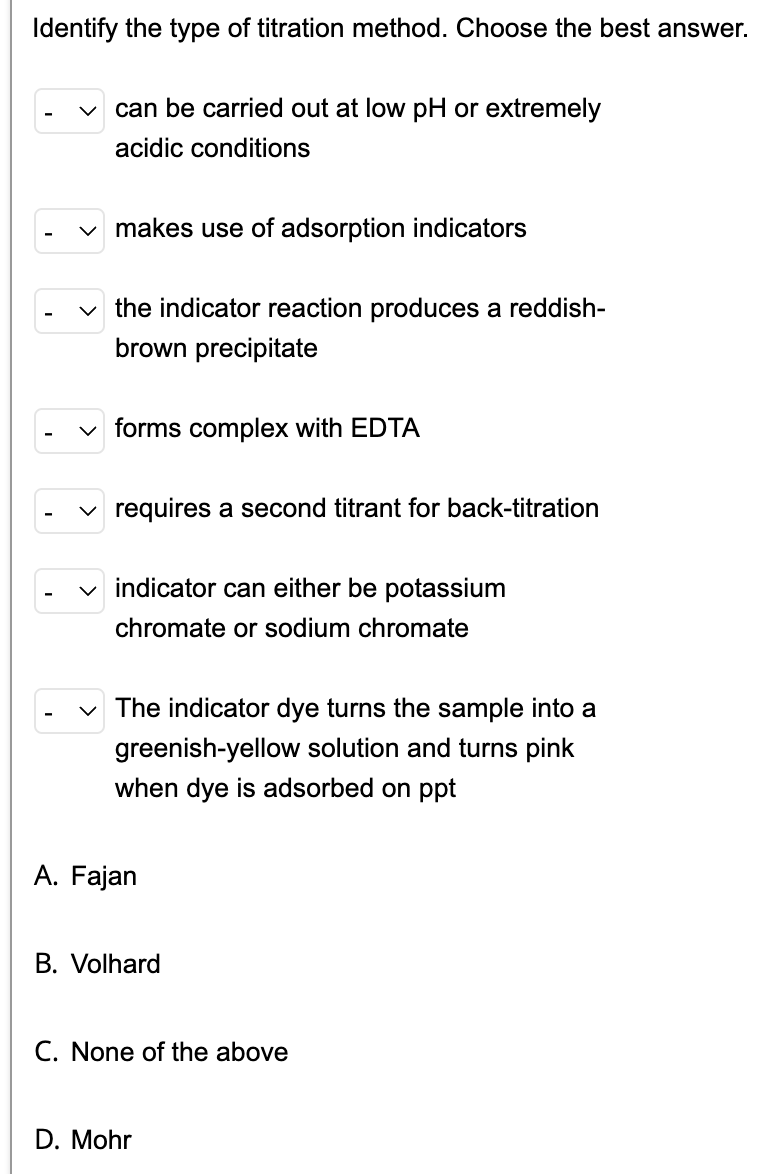Identify the type of titration method. Choose the best answer can be carried out at low pH or extremely acidic conditions makes use of adsorption indicators ✓the indicator reaction produces a reddish- brown precipitate forms complex with EDTA ✓requires a second titrant for back-titration indicator can either be potassium chromate or sodium chromate ✓ The indicator dye turns the sample into a greenish-yellow solution and turns pink when dye is adsorbed on ppt A. Fajan B. Volhard C. None of the above D. Mohr
Identify the type of titration method. Choose the best answer can be carried out at low pH or extremely acidic conditions makes use of adsorption indicators ✓the indicator reaction produces a reddish- brown precipitate forms complex with EDTA ✓requires a second titrant for back-titration indicator can either be potassium chromate or sodium chromate ✓ The indicator dye turns the sample into a greenish-yellow solution and turns pink when dye is adsorbed on ppt A. Fajan B. Volhard C. None of the above D. Mohr
Chemistry
10th Edition
ISBN:9781305957404
Author:Steven S. Zumdahl, Susan A. Zumdahl, Donald J. DeCoste
Publisher:Steven S. Zumdahl, Susan A. Zumdahl, Donald J. DeCoste
Chapter1: Chemical Foundations
Section: Chapter Questions
Problem 1RQ: Define and explain the differences between the following terms. a. law and theory b. theory and...
Related questions
Question

Transcribed Image Text:Identify the type of titration method. Choose the best answer.
can be carried out at low pH or extremely
acidic conditions
✓ makes use of adsorption indicators
✓the indicator reaction produces a reddish-
brown precipitate
forms complex with EDTA
requires a second titrant for back-titration
indicator can either be potassium
chromate or sodium chromate
The indicator dye turns the sample into a
greenish-yellow solution and turns pink
when dye is adsorbed on ppt
A. Fajan
B. Volhard
C. None of the above
D. Mohr
Expert Solution
This question has been solved!
Explore an expertly crafted, step-by-step solution for a thorough understanding of key concepts.
This is a popular solution!
Trending now
This is a popular solution!
Step by step
Solved in 3 steps

Knowledge Booster
Learn more about
Need a deep-dive on the concept behind this application? Look no further. Learn more about this topic, chemistry and related others by exploring similar questions and additional content below.Recommended textbooks for you

Chemistry
Chemistry
ISBN:
9781305957404
Author:
Steven S. Zumdahl, Susan A. Zumdahl, Donald J. DeCoste
Publisher:
Cengage Learning

Chemistry
Chemistry
ISBN:
9781259911156
Author:
Raymond Chang Dr., Jason Overby Professor
Publisher:
McGraw-Hill Education

Principles of Instrumental Analysis
Chemistry
ISBN:
9781305577213
Author:
Douglas A. Skoog, F. James Holler, Stanley R. Crouch
Publisher:
Cengage Learning

Chemistry
Chemistry
ISBN:
9781305957404
Author:
Steven S. Zumdahl, Susan A. Zumdahl, Donald J. DeCoste
Publisher:
Cengage Learning

Chemistry
Chemistry
ISBN:
9781259911156
Author:
Raymond Chang Dr., Jason Overby Professor
Publisher:
McGraw-Hill Education

Principles of Instrumental Analysis
Chemistry
ISBN:
9781305577213
Author:
Douglas A. Skoog, F. James Holler, Stanley R. Crouch
Publisher:
Cengage Learning

Organic Chemistry
Chemistry
ISBN:
9780078021558
Author:
Janice Gorzynski Smith Dr.
Publisher:
McGraw-Hill Education

Chemistry: Principles and Reactions
Chemistry
ISBN:
9781305079373
Author:
William L. Masterton, Cecile N. Hurley
Publisher:
Cengage Learning

Elementary Principles of Chemical Processes, Bind…
Chemistry
ISBN:
9781118431221
Author:
Richard M. Felder, Ronald W. Rousseau, Lisa G. Bullard
Publisher:
WILEY